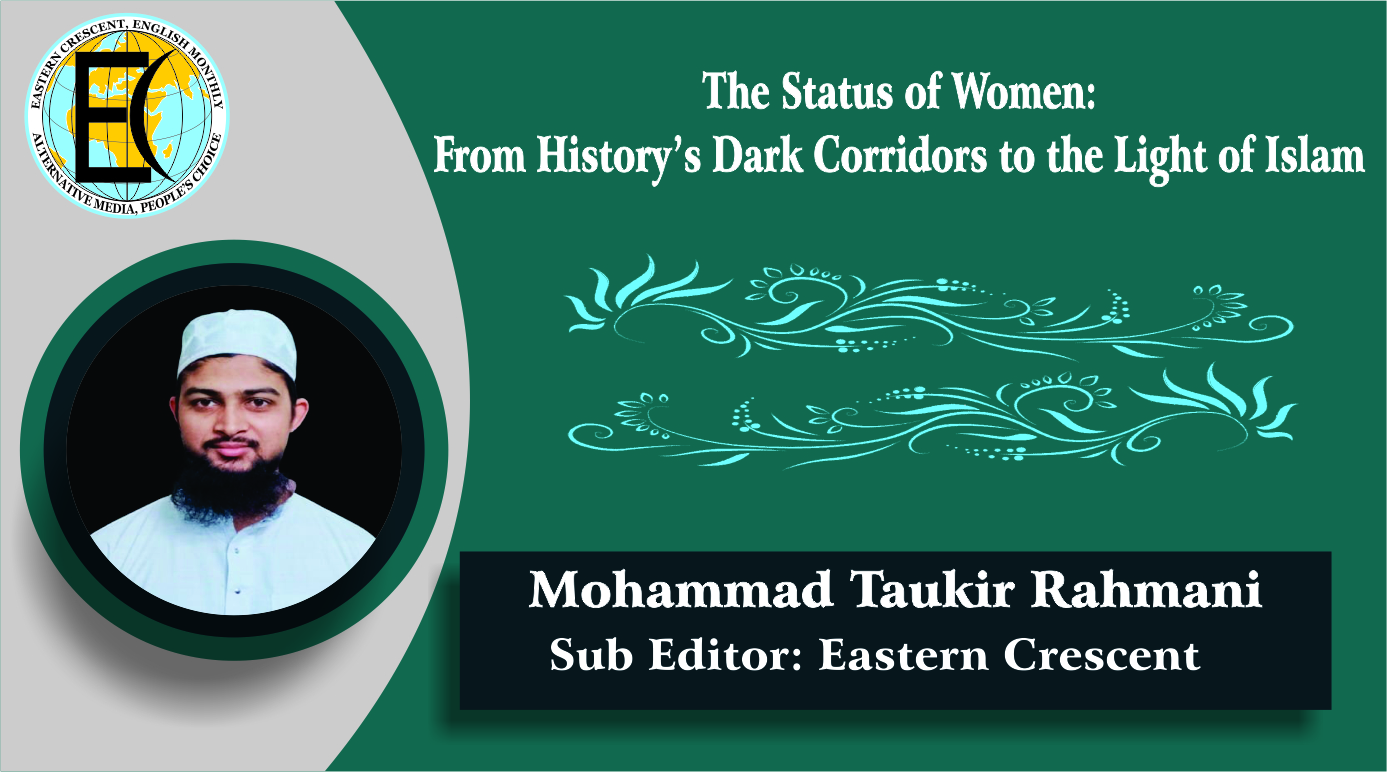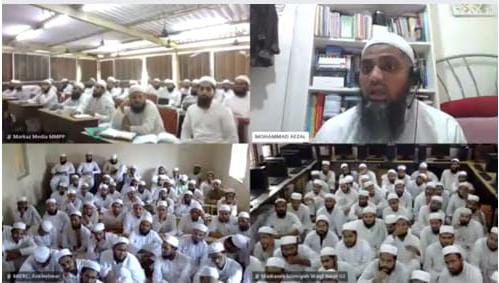
The Status of Women: From History’s Dark Corridors to the Light of Islam
The Status of Women: From History’s Dark Corridors to the Light of Islam
Mohammad Taukir Rahmani
EC Exclusive
The status and rights of women have been subjects of discussion since the earliest days of humanity. Throughout history, different civilizations treated women in diverse ways, often subjecting them to extreme forms of cruelty and oppression. Women were sometimes denied basic dignity and reduced to mere tools for fulfilling desires. At other times, their existence was confined to physical utility, stripping them of their individuality.
The history of oppression against women is a painful chapter, reflecting humanity’s moral downfall. There were times when violating women’s rights was seen as a mark of honor. Society excluded them from humanity’s fold, considering them inferior beings. This was not just a historical reality but a stark reminder of how far human societies can drift from ethical values. The status, dignity, and rights of women have always been a moral issue that continues to challenge our collective conscience.
Women in the Pre-Islamic Era
The era before the advent of Islam, often referred to as the “Age of Ignorance,” paints a grim picture of women’s plight. In ancient India, women were deemed weak, untrustworthy, and unworthy of respect. Disdain for women had become a cultural norm. Their existence depended entirely on their husbands.
If a woman became a widow, her life turned into a nightmare. Widowhood not only stripped her of social dignity but also condemned her to a life of humiliation. She had no right to remarry and often faced relentless scorn and psychological torment. Her life was reduced to servitude, as though she had become a burden on society.
The practice of Sati, where widows were forced to burn themselves alive on their husband’s funeral pyre, was a horrifying example of this oppression. It reflected the cruelty and ignorance of the time, marking one of history’s darkest injustices.
Women in Persian and Roman civilizations fared no better. In these societies, women were often exploited for pleasure, even within their own homes. Sacred relationships like mothers, sisters, and daughters were sometimes violated under the guise of flawed philosophies. These societies blurred the lines of morality, reducing women to mere objects of gratification.
In Arabia, women were subjected to equally severe injustices. They were denied inheritance and had no right to remarry after divorce. The birth of a daughter was considered a disgrace so great that many fathers buried their newborn daughters alive. This was either done in the name of honor or as an excuse for poverty. Historical accounts reveal that Sahabi Sa’sa’a ibn Najiyah personally rescued hundreds of such girls by paying ransom to their families.
Across civilizations, women were consistently denied their humanity. They were treated as tools for pleasure or burdens to be discarded. This injustice continued unchecked until Islam brought a revolutionary change, granting women dignity, rights, and a respected position in society.

The Transformation Brought by Islam
The advent of Islam marked a new dawn for women. It not only ended the injustices of the past but also provided women with rights and dignity that were unparalleled. The Quran declared:
“And for women are rights over men similar to those of men over women.” (Al-Baqarah: 228)
This declaration placed women on an equal footing with men, emphasizing their equal rights and responsibilities. Islam also granted women the right to inherit, a revolutionary change for societies that once treated women as property. The Quran states:
“For men is a share of what their parents and close relatives leave, and for women is a share of what their parents and close relatives leave—be it little or much—a share decreed.” (An-Nisa: 7)
Through these teachings, Islam ensured that women were no longer excluded from humanity’s fold. It elevated them to positions of respect and granted them rights that were both divinely ordained and legally protected. The Quran further emphasized women’s honor by dedicating an entire chapter, Surah An-Nisa, to their welfare and rights.
Women in the Modern World
Today, the modern world claims to champion women’s rights and freedom. However, in many ways, it has subjected women to a new form of exploitation. Western societies often portray women as mere physical entities, emphasizing beauty and youth while ignoring their dignity and individuality. Women are praised for their physical appearance but discarded as they age, much like objects of temporary utility.
This mindset reflects a return to the ignorance that Islam eradicated. Under the guise of freedom, women are once again being stripped of their true worth. Relationships like motherhood, sisterhood, and daughterhood are being devalued in favor of superficial ideals. Even the act of killing unborn daughters—a practice Islam abolished—is re-emerging under the guise of modern family planning.
Islam’s Eternal Message
Islam offers a timeless solution to these challenges. It envisions women as the foundation of families, builders of societies, and protectors of humanity’s moral fabric. A woman’s worth lies in her character, values, and contributions, not in her physical appearance or societal trends.
The Quran and the teachings of the Prophet Muhammad ﷺ emphasize the protection of women’s rights and dignity. Islam ensures that women are treated with respect and compassion, as exemplified by the clear guidelines on their rights and responsibilities.
In conclusion, Islam brought a profound transformation to the status of women, replacing centuries of oppression with equality, dignity, and respect. Its message is as relevant today as it was then, offering guidance for a world still struggling to truly honor women’s rights. As humanity moves forward, it is imperative to revisit and embrace these teachings, ensuring justice and dignity for women in every era.
You May Also Like
 Breaking News
Breaking NewsIndian-Origin Sir Mufti Hamid Patel Appointed as Interim Chair of Ofsted
Indian-Origin Sir Mufti Hamid Patel Appointed as Interim Chair of Ofsted EC News Desk...
 Europe
EuropeTwo Years of Genocide, Resistance, Ceasefire and Hope in Gaza
Two Years of Genocide, Resistance, Ceasefire and Hope in Gaza By: Khursheed Alam Dawood...
 Europe
EuropeUnder the Shadow of Starvation and Famine in Gaza; Netanyahu's Dream for Greater Israel; A Clarion Call to the Arab Leaderships
Under the Shadow of Starvation and Famine in Gaza; Netanyahu's Dream for Greater Israel;...
 Europe
EuropeIsrael-Iran War and the Massacre in Gaza
Israel-Iran War and the Massacre in Gaza By: Khursheed Alam Daoud Qasmi Israel’s Attack...
 Breaking News
Breaking NewsGenocide in Gaza and Global Silence
Genocide in Gaza and Global Silence By: Khursheed Alam Dawood Qasmi Donald Trump’s Middle...
 EDUCATION
EDUCATIONUK Based Scholar Maulana Muhammad Afzal Qasmi Addresses DELL Students
UK Based Scholar Maulana Muhammad Afzal Qasmi Addresses DELL Students EC News Desk 10/09/2024...

Comments (0)
Leave a Comment